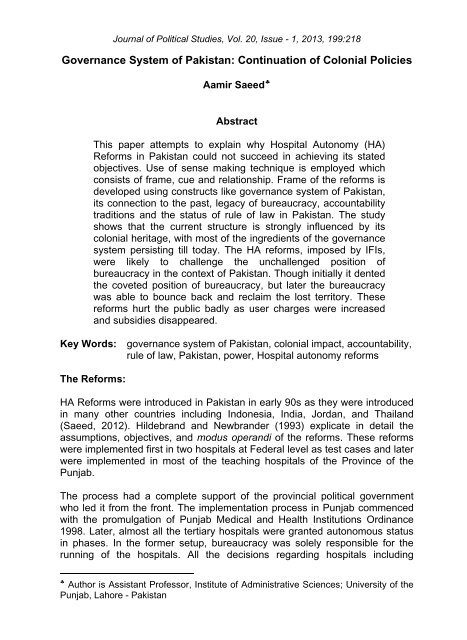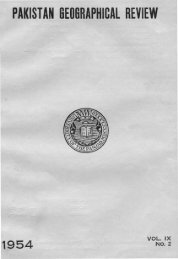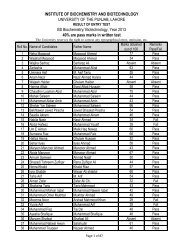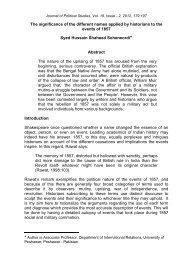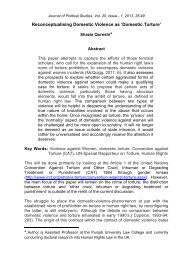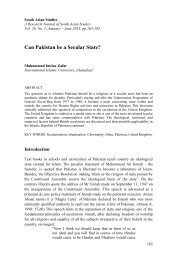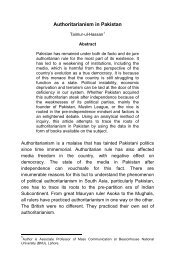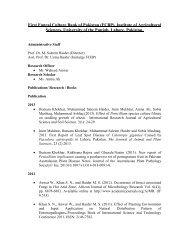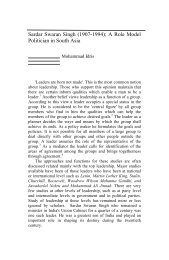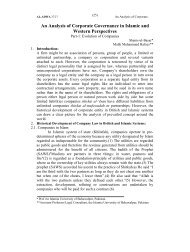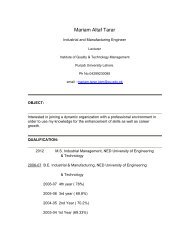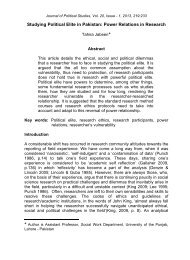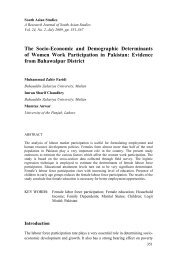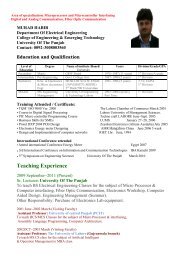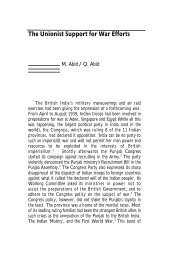Continuation of Colonial Policies by Aamir Saeed - University of the ...
Continuation of Colonial Policies by Aamir Saeed - University of the ...
Continuation of Colonial Policies by Aamir Saeed - University of the ...
Create successful ePaper yourself
Turn your PDF publications into a flip-book with our unique Google optimized e-Paper software.
Journal <strong>of</strong> Political Studies, Vol. 20, Issue - 1, 2013, 199:218<br />
Governance System <strong>of</strong> Pakistan: <strong>Continuation</strong> <strong>of</strong> <strong>Colonial</strong> <strong>Policies</strong><br />
<strong>Aamir</strong> <strong>Saeed</strong> ♣<br />
Abstract<br />
This paper attempts to explain why Hospital Autonomy (HA)<br />
Reforms in Pakistan could not succeed in achieving its stated<br />
objectives. Use <strong>of</strong> sense making technique is employed which<br />
consists <strong>of</strong> frame, cue and relationship. Frame <strong>of</strong> <strong>the</strong> reforms is<br />
developed using constructs like governance system <strong>of</strong> Pakistan,<br />
its connection to <strong>the</strong> past, legacy <strong>of</strong> bureaucracy, accountability<br />
traditions and <strong>the</strong> status <strong>of</strong> rule <strong>of</strong> law in Pakistan. The study<br />
shows that <strong>the</strong> current structure is strongly influenced <strong>by</strong> its<br />
colonial heritage, with most <strong>of</strong> <strong>the</strong> ingredients <strong>of</strong> <strong>the</strong> governance<br />
system persisting till today. The HA reforms, imposed <strong>by</strong> IFIs,<br />
were likely to challenge <strong>the</strong> unchallenged position <strong>of</strong><br />
bureaucracy in <strong>the</strong> context <strong>of</strong> Pakistan. Though initially it dented<br />
<strong>the</strong> coveted position <strong>of</strong> bureaucracy, but later <strong>the</strong> bureaucracy<br />
was able to bounce back and reclaim <strong>the</strong> lost territory. These<br />
reforms hurt <strong>the</strong> public badly as user charges were increased<br />
and subsidies disappeared.<br />
Key Words: governance system <strong>of</strong> Pakistan, colonial impact, accountability,<br />
rule <strong>of</strong> law, Pakistan, power, Hospital autonomy reforms<br />
The Reforms:<br />
HA Reforms were introduced in Pakistan in early 90s as <strong>the</strong>y were introduced<br />
in many o<strong>the</strong>r countries including Indonesia, India, Jordan, and Thailand<br />
(<strong>Saeed</strong>, 2012). Hildebrand and Newbrander (1993) explicate in detail <strong>the</strong><br />
assumptions, objectives, and modus operandi <strong>of</strong> <strong>the</strong> reforms. These reforms<br />
were implemented first in two hospitals at Federal level as test cases and later<br />
were implemented in most <strong>of</strong> <strong>the</strong> teaching hospitals <strong>of</strong> <strong>the</strong> Province <strong>of</strong> <strong>the</strong><br />
Punjab.<br />
The process had a complete support <strong>of</strong> <strong>the</strong> provincial political government<br />
who led it from <strong>the</strong> front. The implementation process in Punjab commenced<br />
with <strong>the</strong> promulgation <strong>of</strong> Punjab Medical and Health Institutions Ordinance<br />
1998. Later, almost all <strong>the</strong> tertiary hospitals were granted autonomous status<br />
in phases. In <strong>the</strong> former setup, bureaucracy was solely responsible for <strong>the</strong><br />
running <strong>of</strong> <strong>the</strong> hospitals. All <strong>the</strong> decisions regarding hospitals including<br />
♣ Author is Assistant Pr<strong>of</strong>essor, Institute <strong>of</strong> Administrative Sciences; <strong>University</strong> <strong>of</strong> <strong>the</strong><br />
Punjab, Lahore - Pakistan
<strong>Aamir</strong> <strong>Saeed</strong><br />
financial, HR, administrative, purchasing, infrastructural development were<br />
made <strong>by</strong> <strong>the</strong> bureaucracy. Though subsequently doctors were made <strong>the</strong><br />
heads <strong>of</strong> <strong>the</strong> hospitals, yet <strong>the</strong>y were literally powerless and depended on <strong>the</strong><br />
bureaucracy for <strong>the</strong> day to day running <strong>of</strong> <strong>the</strong>ir organizations, as were o<strong>the</strong>r<br />
specialists/technical experts in <strong>the</strong>ir respective institutions.<br />
This setup continued for a couple <strong>of</strong> years before it was terminated <strong>by</strong> <strong>the</strong><br />
military government <strong>of</strong> Gen. Musharraf who had assumed power after staging<br />
a coup d'état against <strong>the</strong> political government. A revised version <strong>of</strong> <strong>the</strong><br />
Ordinance was launched in 2002 which lasted for around a year. However,<br />
this also had to be halted in wake <strong>of</strong> protests and agitation <strong>of</strong> doctors’<br />
community. Later an enquiry commission was instituted to examine <strong>the</strong><br />
charges and to enquire into <strong>the</strong> issues which led to <strong>the</strong> abandoning <strong>of</strong> <strong>the</strong><br />
reforms. Subsequently, in <strong>the</strong> light <strong>of</strong> <strong>the</strong> findings <strong>of</strong> <strong>the</strong> commission, <strong>the</strong><br />
bogey <strong>of</strong> reforms was again put on track in 2003 <strong>by</strong> launching ano<strong>the</strong>r version<br />
<strong>of</strong> autonomy reforms which is still in place.<br />
However <strong>the</strong> experience <strong>of</strong> granting autonomy to teaching hospital has not<br />
been able to realize <strong>the</strong> objectives which were set initially. The four<br />
stakeholders identified during <strong>the</strong> data collection process are donors,<br />
politician, bureaucrats and doctors. All <strong>of</strong> <strong>the</strong>m enjoyed a unique status during<br />
<strong>the</strong> process and were able to influence it at different stages. As mentioned<br />
earlier that <strong>the</strong>se reforms were initiated <strong>by</strong> <strong>the</strong> IFIs, <strong>the</strong>y had a unique<br />
meaning <strong>of</strong> <strong>the</strong> concept <strong>of</strong> ‘autonomy’, however this concept also had local<br />
meanings which were embedded in <strong>the</strong> historical developments, power<br />
struggles among various groups in society and social context. Once this<br />
reform intervention was made in <strong>the</strong> society, it became part <strong>of</strong> <strong>the</strong> ongoing<br />
flow <strong>of</strong> <strong>the</strong> events in <strong>the</strong> country and different stakeholder got engaged in <strong>the</strong><br />
process <strong>of</strong> sensegiving and sensemaking (Gioia and Chittipeddi, 1991) <strong>of</strong> <strong>the</strong><br />
concept. According to <strong>Saeed</strong> (2012), <strong>the</strong> process failed to achieve its claimed<br />
objectives. Sense making technique helps in understanding particular<br />
phenomenon <strong>by</strong> keeping it and relating with its peculiar context. So this article<br />
attempts to present <strong>the</strong> context/ frame which led <strong>the</strong> reform to its eventuality. It<br />
is very essential to identify <strong>the</strong> social causes which led to its failure as this<br />
reform has a higher cost for <strong>the</strong> society in terms <strong>of</strong> added loans, deterioration<br />
<strong>of</strong> health services, escalation in <strong>the</strong> cost <strong>of</strong> <strong>the</strong> services, deprivation <strong>of</strong> <strong>the</strong><br />
poor etc. (<strong>Saeed</strong>, 2012).<br />
Literature on implementation can be bifurcated in two categories i.e. pre-1970<br />
and post-1970 era. It was around 1970 when modern implementation<br />
literature started to emerge along with <strong>the</strong> explosion <strong>of</strong> social sciences and<br />
particularly its application on policy studies. Alluding to <strong>the</strong> literature <strong>of</strong> pre-<br />
1970 era, Hill and Hupe (2002) mention that “(w)ithin that literature concerns<br />
are expressed that are very central to controversy within implementation<br />
<strong>the</strong>ory: about <strong>the</strong> rule <strong>of</strong> law, accountability and <strong>the</strong> roles <strong>of</strong> civil servants<br />
200
Governance System <strong>of</strong> Pakistan: <strong>Continuation</strong> <strong>of</strong> <strong>Colonial</strong> <strong>Policies</strong><br />
within <strong>the</strong> policy process”(p. 19). They mention two o<strong>the</strong>r concepts strongly<br />
related to <strong>the</strong> implementation i.e. ‘democracy’ and ‘rule <strong>of</strong> law’ (p. 22). The two<br />
concepts i.e. ‘roles <strong>of</strong> civil servants within policy process’ and ‘democracy’ are<br />
part <strong>of</strong> <strong>the</strong> governance model and will be dealt with in concert. Thus, <strong>the</strong><br />
‘frame’ which will be used to make sense <strong>of</strong> <strong>the</strong> ‘cue’ <strong>of</strong> <strong>the</strong> implementation <strong>of</strong><br />
HA reform will be made up <strong>of</strong> <strong>the</strong> governance model, rule <strong>of</strong> law and<br />
accountability.<br />
This paper employs <strong>the</strong> technique <strong>of</strong> sensemaking. According to Weick "(t)he<br />
basic idea <strong>of</strong> sensemaking is that reality is an ongoing accomplishment that<br />
emerges from efforts to create order and make retrospectives sense <strong>of</strong> what<br />
occurs"(1993: 635). And according to Schwandt (2005) sense making is a<br />
“process that includes <strong>the</strong> use <strong>of</strong> prior knowledge to assign meaning to new<br />
information…It is not simply <strong>the</strong> interpretation <strong>of</strong> information; ra<strong>the</strong>r, <strong>the</strong><br />
continuous interaction with information allows meaning to emerge” (p. 182).<br />
And according to Fiss and Hirsch (2005) “(s)ensemaking stresses <strong>the</strong> internal,<br />
self-conscious process <strong>of</strong> developing a coherent account <strong>of</strong> what is going on<br />
(p. 31).<br />
Weick (1995) explains <strong>the</strong> process in <strong>the</strong>se words, “sense making starts with<br />
three elements: a frame, a cue and a connection…frames and cues can be<br />
thought <strong>of</strong> as vocabularies in which words that are more abstract (frames)<br />
include and point to o<strong>the</strong>r less abstract words (cues) that become sensible in<br />
<strong>the</strong> context created <strong>by</strong> <strong>the</strong> more inclusive words. Meaning within <strong>the</strong><br />
vocabularies is relational. A cue in a frame is what makes sense not <strong>the</strong> cue<br />
alone or <strong>the</strong> frame alone” (p 110). In nutshell, sensemaking is a process <strong>of</strong><br />
developing meaning <strong>of</strong> a particular action in <strong>the</strong> backdrop <strong>of</strong> <strong>the</strong> past<br />
occurrences. In <strong>the</strong> next section, a set <strong>of</strong> various relevant and related events<br />
are discussed to make sense <strong>of</strong> <strong>the</strong> concept <strong>of</strong> autonomy.<br />
Governance Model <strong>of</strong> <strong>the</strong> state <strong>of</strong> Pakistan<br />
The creation <strong>of</strong> democratic institutions in different parts <strong>of</strong> <strong>the</strong> world has<br />
espoused binary patterns depending on which among bureaucratic structures<br />
and democracy emerged first. Hill and Hope (2002) advance <strong>the</strong> analysis <strong>of</strong><br />
<strong>the</strong> issue through two contrasting cases. The first case is that <strong>of</strong> <strong>the</strong> United<br />
States where government/bureaucratic structures were designed after<br />
democracy was established in <strong>the</strong> country. It was <strong>the</strong> evolutionary process <strong>of</strong><br />
history including <strong>the</strong> war <strong>of</strong> independence that instigated <strong>the</strong> development <strong>of</strong><br />
democratic ideas and concepts which eventually became <strong>the</strong> overarching<br />
ethos <strong>of</strong> society on which <strong>the</strong> governance structure <strong>of</strong> <strong>the</strong> country was finally<br />
established. Thus <strong>the</strong> democratic principles predated <strong>the</strong> governance<br />
structure <strong>of</strong> <strong>the</strong> country. Opposite to this is <strong>the</strong> case <strong>of</strong> Germany where<br />
governance structures prevailed much earlier than <strong>the</strong> introduction <strong>of</strong><br />
democracy. Democracy was planted under <strong>the</strong> garb <strong>of</strong> ‘nation building’ where<br />
201
<strong>Aamir</strong> <strong>Saeed</strong><br />
ei<strong>the</strong>r <strong>the</strong> existing structures were transformed into democratic ones or new<br />
ones based on <strong>the</strong> requirement <strong>of</strong> democratic values were installed.<br />
Democratic institutions were reared, guarded and institutionalized to thwart<br />
any chance <strong>of</strong> <strong>the</strong> rise <strong>of</strong> a new Hitler in <strong>the</strong> future.<br />
The case <strong>of</strong> Pakistan corresponds to <strong>the</strong> case <strong>of</strong> Germany in that democracy<br />
was injected from outside at <strong>the</strong> time <strong>of</strong> independence while <strong>the</strong> bureaucratic<br />
structures and systems were installed <strong>by</strong> <strong>the</strong> colonial administration more than<br />
a century ago. In <strong>the</strong> case <strong>of</strong> Pakistan, though democratic institutions were<br />
planted, yet democratic principles like equality, accountability, transparency<br />
etc. could not take root in <strong>the</strong> society. The required suitable conditions for<br />
democracy were not cultivated <strong>by</strong> <strong>the</strong> leaders <strong>of</strong> <strong>the</strong> country with <strong>the</strong> result<br />
that people’ power could not be institutionalized and <strong>the</strong> erstwhile elites were<br />
able to continue <strong>the</strong>ir reign. According to Weinbaum (1996):<br />
(t)he subsequent education <strong>of</strong> people to accept democracy<br />
through meaningful participation in <strong>the</strong>ir political affairs was<br />
minimal. Without wide public awareness and an effective public<br />
opinion, <strong>the</strong> political system gave wide berth to ambitious and<br />
corrupt political leaders. Instead <strong>of</strong> including a broad citizenry in<br />
<strong>the</strong> political process, power was concentrated in <strong>the</strong> hands <strong>of</strong><br />
an elitist bureaucracy and overambitious military. The country's<br />
semi-feudal system with its sets <strong>of</strong> obligations and hierarchy<br />
provided similarly inhospitable soil for building a democracy (p.<br />
641).<br />
Moreover, in <strong>the</strong> absence <strong>of</strong> any serious ‘nation building’ effort <strong>by</strong> <strong>the</strong> USA in<br />
Pakistan as was <strong>the</strong> case in Germany, nascent democratic principles could<br />
not vie against colonial governance structure in Pakistan which was sustained<br />
and carried along <strong>by</strong> colonial bureaucracies. Perhaps introduction <strong>of</strong><br />
democracy in Pakistan was not a priority for USA as military governments<br />
served its international designs and objectives better. As Mukherjee (2010)<br />
elaborates on this point that:<br />
US establishment has always found it easier to deal with a<br />
military general than to get involved in messy local politics, but<br />
<strong>the</strong> point is not so much that <strong>the</strong> US always supports generals,<br />
but ra<strong>the</strong>r that US support for democracy in Pakistan has come<br />
second to broader geopolitical considerations, thus enabling<br />
<strong>the</strong> generals to secure substantial external backing (p. 74).<br />
Three decade-long spells <strong>of</strong> military governments compared to zero<br />
completed tenures <strong>of</strong> <strong>the</strong> political governments is testimony to this. All military<br />
governments had close cooperation with US international campaigns and<br />
enjoyed very intimate relations with <strong>the</strong> US government during those<br />
202
Governance System <strong>of</strong> Pakistan: <strong>Continuation</strong> <strong>of</strong> <strong>Colonial</strong> <strong>Policies</strong><br />
campaigns. These generals ruled <strong>the</strong> country like absolute monarchs –<br />
considering <strong>the</strong>mselves accountable to none.<br />
The role <strong>of</strong> politicians has not been exemplary ei<strong>the</strong>r. According to Mukherjee<br />
(2010), “(i)t must be admitted that Pakistan’s civilian politicians have <strong>of</strong>ten<br />
acted, in <strong>the</strong>ir own interests, as arbitrarily as <strong>the</strong> military, with more corruption<br />
and less concept <strong>of</strong> real democracy and national unity “(p. 74).<br />
Weinbaum (1996) comments on <strong>the</strong> extent <strong>of</strong> public confidence <strong>of</strong> on <strong>the</strong><br />
democratic drama:<br />
large numbers <strong>of</strong> Pakistanis continue to believe that elections<br />
are exercises in intimidation and outright fraud. Moreover, very<br />
little <strong>of</strong> political life is seen as egalitarian. Politics tends to<br />
reflect <strong>the</strong> highly stratified character <strong>of</strong> social classes in<br />
Pakistan where, in general, most citizens see political debates<br />
and contests as largely irrelevant to <strong>the</strong>ir lives. Pakistan's<br />
voting turnout, usually greatly exaggerated in <strong>of</strong>ficial reports as<br />
exceeding 60% <strong>of</strong> eligible voters, was probably between 30%<br />
and 40% in 1989 and 1993 (p. 645).<br />
So to a large extent <strong>the</strong> governance model <strong>of</strong> Pakistan is modeled on inherited<br />
colonial structure. At <strong>the</strong> inception <strong>of</strong> <strong>the</strong> country in 1947, Government <strong>of</strong> India<br />
Act 1935 was embraced as <strong>the</strong> law <strong>of</strong> <strong>the</strong> land after some skin-deep changes.<br />
Most <strong>of</strong> <strong>the</strong> laws, rules, manuals, codes and structures carved out to achieve<br />
colonial objectives were perpetuated in letter and spirit in <strong>the</strong> now<br />
‘independent’ country. According to Egger (1953) “<strong>the</strong> colonial government<br />
was a law-and-order government, <strong>the</strong> function <strong>of</strong> which, except in time <strong>of</strong><br />
famine, did not extend appreciably beyond internal tranquility and collecting<br />
<strong>the</strong> revenue (p. 1)”. At <strong>the</strong> heart <strong>of</strong> <strong>the</strong> colonial government was ICS – <strong>the</strong><br />
steel frame <strong>of</strong> Raj – <strong>the</strong> generalist bureaucracy which served its master in<br />
most effective and efficient manner.<br />
While discussing <strong>the</strong> characteristics <strong>of</strong> men in bureaucracy, Gladieux (1955)<br />
said that “since <strong>the</strong> majority <strong>of</strong> such personnel tend to have essentially <strong>the</strong><br />
same educational and experience background <strong>the</strong>re is produced a civil service<br />
which tends to be quite uniform in interest and outlook”. Such structure “was<br />
well suited to government in <strong>the</strong> law and order days <strong>of</strong> colonialism when it was<br />
necessary to keep <strong>the</strong> country under firm control through a small foreign<br />
bureaucracy”. However, after <strong>the</strong> ‘independence’, demands <strong>of</strong> <strong>the</strong> country<br />
were altoge<strong>the</strong>r different, now people ra<strong>the</strong>r than <strong>the</strong> rulers should have been<br />
served. There was a pressing need to develop sound technocrats including<br />
engineers, doctors, scientist, economists, teachers etc. which could help<br />
develop <strong>the</strong> country and contribute towards <strong>the</strong> wellbeing <strong>of</strong> <strong>the</strong> people.<br />
However, <strong>the</strong> dominance <strong>of</strong> <strong>the</strong> generalist bureaucracy stemming from <strong>the</strong>ir<br />
203
<strong>Aamir</strong> <strong>Saeed</strong><br />
colonial past continued due to <strong>the</strong> peculiar circumstances prevailing in <strong>the</strong><br />
country and never allowed this change to take place. According to Islam<br />
(2004), “(t)he vice-regal traditions <strong>of</strong> colonial India were embedded in <strong>the</strong><br />
plans for Pakistan’s governance” (p. 318).<br />
The dominance <strong>of</strong> <strong>the</strong> generalist bureaucracy didn’t allow specialists <strong>the</strong>ir due<br />
rights who were subjected to comparatively poor pay structures, underemployment,<br />
declining standards <strong>of</strong> education and training, lack <strong>of</strong> respect<br />
and nuisance value in society (Kennedy, 1987). Doctors wanted to be freed<br />
from <strong>the</strong> influence <strong>of</strong> <strong>the</strong> bureaucracy and took <strong>the</strong> mirage <strong>of</strong> autonomy<br />
reforms as ‘water’ for quenching <strong>the</strong>ir thirst for independence.<br />
In <strong>the</strong> case <strong>of</strong> hospital autonomy, <strong>the</strong> reforms interestingly were not directed<br />
towards ameliorating <strong>the</strong> health services for <strong>the</strong> masses. It was only aimed at<br />
unburdening government <strong>of</strong> its financial obligation towards public hospitals. It<br />
was an imposed prescription <strong>of</strong> <strong>the</strong> IFIs which was gleefully conceded to <strong>by</strong><br />
<strong>the</strong> politicians since with <strong>the</strong> reforms was appended specific amount <strong>of</strong> dollars<br />
which was to become <strong>the</strong> destiny <strong>of</strong> fortunate few. They owned and<br />
proclaimed <strong>the</strong>se reforms as a panacea for all <strong>the</strong> health problems and<br />
pursued it robustly. Yet what society attained from <strong>the</strong>se reforms is expressed<br />
below in <strong>the</strong> words <strong>of</strong> some informants whom <strong>the</strong> researcher interviewed<br />
during data collection.<br />
One employee <strong>of</strong> <strong>the</strong> hospital used <strong>the</strong>se words to explain <strong>the</strong> situation:<br />
One big issue in post-autonomy scenario is that patients have<br />
suffered in many ways. One aspect is <strong>the</strong> user charges which<br />
had made treatment difficult for <strong>the</strong> poor. Secondly, patient<br />
care was compromised through rhetoric, report making. There<br />
was a lot <strong>of</strong> emphasis <strong>of</strong> reports which were demanded <strong>by</strong><br />
Government and supplied <strong>by</strong> <strong>the</strong> hospitals. Chief Executive<br />
hired media men who would keep him and his activities alive in<br />
<strong>the</strong> media. A cycle <strong>of</strong> self-praise, public relations started which<br />
badly affected patient care.<br />
In Post-autonomy even <strong>the</strong> staff <strong>of</strong> CE became very rude and<br />
treated employees with disgust. Now more emphasis was on<br />
how many machines were out <strong>of</strong> order, how many had been<br />
repaired. In one instance, some doctors asked a patient to<br />
fetch some medicine from dispensary; he was told that it was<br />
out <strong>of</strong> stock. When he informed <strong>the</strong> doctors, one <strong>of</strong> <strong>the</strong>m<br />
remarked that you should have brought three or four bricks<br />
(referring to too much civil work going on in <strong>the</strong> hospital).<br />
Earlier <strong>the</strong>re were 250 or so house <strong>of</strong>ficers and each ward had<br />
around 10 <strong>of</strong>ficers. They would prepare <strong>the</strong> patients <strong>by</strong><br />
204
Governance System <strong>of</strong> Pakistan: <strong>Continuation</strong> <strong>of</strong> <strong>Colonial</strong> <strong>Policies</strong><br />
conducting necessary tests and undertaking o<strong>the</strong>r formalities<br />
for <strong>the</strong> operation next day. Now <strong>the</strong> number <strong>of</strong> nurses and<br />
doctors has decreased which has resulted in <strong>the</strong> deterioration<br />
in <strong>the</strong> patient care level.<br />
One senior doctor commented on <strong>the</strong> situation like this:<br />
current dual system has slaughtered <strong>the</strong> merit and<br />
responsibility lies both on bureaucracy and management <strong>of</strong> <strong>the</strong><br />
hospital. He said <strong>the</strong> recommendation <strong>of</strong> <strong>the</strong> pr<strong>of</strong>essors having<br />
25 years or so experience for junior efficient doctors are turned<br />
down and decision are made whimsically. All service rules are<br />
ignored while making inductions.<br />
And one bureaucrat explained <strong>the</strong> situation <strong>by</strong> saying that:<br />
<strong>the</strong> poor have been <strong>the</strong> main victim <strong>of</strong> <strong>the</strong> system. Rates <strong>of</strong><br />
health services have shot up. Their surgery is delayed for<br />
months. Doctors use space, facilities, reputation <strong>of</strong> government<br />
hospitals and get share from <strong>the</strong> income <strong>of</strong> <strong>the</strong> hospitals. They<br />
get share from <strong>the</strong> income generated <strong>by</strong> operations in <strong>the</strong><br />
morning as well. They have no pr<strong>of</strong>essionalism.<br />
Referring to <strong>the</strong> issue <strong>of</strong> dominance <strong>of</strong> generalist bureaucracy over specialist,<br />
ano<strong>the</strong>r senior doctor illustrated <strong>the</strong> point <strong>by</strong> giving his personal example in<br />
<strong>the</strong>se words:<br />
Bureaucracy is dominant over <strong>the</strong> cream <strong>of</strong> <strong>the</strong> society. After<br />
passing intermediate exam he moved to <strong>the</strong> medical college.<br />
After graduating in 5 years through extremely hard work and<br />
one year <strong>of</strong> house job he moved abroad for post-graduation.<br />
On his return he had to appear before a committee for selection<br />
against a government job where he found his class fellow<br />
among <strong>the</strong> interviewers who could not get enough marks for<br />
admission in medical college. So he took <strong>the</strong> route towards<br />
CSS and got posted in DOH. He said that second raters were<br />
ruling <strong>the</strong> country. He said this was a unique country where <strong>by</strong><br />
doing FA (intermediate, 12 years education) you could become<br />
president <strong>of</strong> <strong>the</strong> country. He said that <strong>the</strong> base <strong>of</strong> <strong>the</strong> structure<br />
<strong>of</strong> our country was flawed.<br />
Democracy generally thought to be promoting equality, freedom, and<br />
fundamental rights, yet here it is yet ano<strong>the</strong>r instrument for <strong>the</strong> exploitation <strong>of</strong><br />
<strong>the</strong> masses. All <strong>the</strong> institutions <strong>of</strong> democracy are placed in <strong>the</strong> society in<br />
imitation to <strong>the</strong> west. Political parties are hereditary in nature and not based<br />
205
<strong>Aamir</strong> <strong>Saeed</strong><br />
on ideology or principles, bureaucracy is considered personal subordinates to<br />
<strong>the</strong> politicians, and courts are bearable to <strong>the</strong> rulers to <strong>the</strong> extent that <strong>the</strong>y<br />
award verdicts to suit <strong>the</strong>ir motives.<br />
Sial (2011) presents a picture <strong>of</strong> <strong>the</strong> current state <strong>of</strong> affairs with reference to<br />
<strong>the</strong> governance mechanism prevailing in <strong>the</strong> society in <strong>the</strong> following<br />
paragraph:<br />
State <strong>of</strong>ficials (are) seen more committed to perform obligations<br />
assumed under secret agreements against territorial<br />
sovereignty. State is facing illegal interference in its exclusive<br />
internal affairs. State has lost its capacity to frame its policies<br />
according to its national priorities. Its parliament seems to have<br />
imperfect control over decision-making process. Parliament<br />
doesn’t seem to have self-regulating capacity. The executive<br />
organ seems not accountable to <strong>the</strong> parliament. Public service<br />
system has lost its capacity to deliver national services and has<br />
converted <strong>the</strong> range <strong>of</strong> its obligations to its privileges. State<br />
economy indebted to national as well international monetary<br />
institutions to <strong>the</strong> tune <strong>of</strong> billions <strong>of</strong> dollars have rendered its<br />
economic independence vulnerable. State exchequer extracted<br />
out <strong>of</strong> its poverty-ridden population and territorial possessions<br />
is spent upon luxurious spending and have no return for its<br />
citizens. Judicial system has been made subservient to<br />
executive organ. Armed and resourceful sections <strong>of</strong> society<br />
have replaced system <strong>of</strong> rule <strong>of</strong> law with rule <strong>of</strong> force in <strong>the</strong><br />
country (p. 127).<br />
The remarks <strong>of</strong> one respondent about <strong>the</strong> Autonomy Reforms sum <strong>the</strong> whole<br />
story. He said that ‘after around 12 year <strong>of</strong> <strong>the</strong> process we are back to square<br />
one’.<br />
Accountability<br />
Policy making and implementation processes involve massive amount <strong>of</strong> taxpayers’<br />
money on one side and solution <strong>of</strong> pressing public issues which might<br />
concern public at large on <strong>the</strong> o<strong>the</strong>r. In o<strong>the</strong>r words, it is essential that <strong>the</strong><br />
objectives are achieved effectively and efficiently. Failure in both <strong>the</strong> criteria<br />
needs to be investigated and examined such that causes are fathomed and<br />
unriddled and those responsible for <strong>the</strong> failure are held accountable. If <strong>the</strong><br />
accountability processes are not inbuilt in <strong>the</strong> system, inefficiency and<br />
ineffectiveness will be a commonplace feature <strong>of</strong> <strong>the</strong> society and this is<br />
precisely what happened in <strong>the</strong> case <strong>of</strong> HA reform in Punjab.<br />
206
Governance System <strong>of</strong> Pakistan: <strong>Continuation</strong> <strong>of</strong> <strong>Colonial</strong> <strong>Policies</strong><br />
In order to fully grasp <strong>the</strong> issue <strong>of</strong> accountability we need to have an allinclusive<br />
view <strong>of</strong> <strong>the</strong> process <strong>of</strong> implementation <strong>of</strong> HA Reforms. Starting from<br />
<strong>the</strong> process <strong>of</strong> policy making, in a democratic state, it’s <strong>the</strong> public who are<br />
supposed to solve <strong>the</strong>ir issue <strong>by</strong> <strong>the</strong>mselves. Failure in this regard<br />
necessitates delegation <strong>of</strong> powers to <strong>the</strong>ir representatives who are <strong>the</strong>n<br />
expected to solve <strong>the</strong> problems. So practically, it is <strong>the</strong> representatives <strong>of</strong> <strong>the</strong><br />
people in a democratic country who assume <strong>the</strong> task <strong>of</strong> making public policies.<br />
So in Pakistan, which constitutionally is a sovereign and democratic country,<br />
<strong>the</strong> public agents should be making policies. However, as has been<br />
established already that <strong>the</strong> policy <strong>of</strong> hospital autonomy was imposed <strong>by</strong> <strong>the</strong><br />
IFIs. And though <strong>the</strong>y completed all <strong>the</strong> customary rituals deemed necessary<br />
to portray policies as representative <strong>of</strong> <strong>the</strong> views <strong>of</strong> majority <strong>of</strong> <strong>the</strong><br />
stakeholders, <strong>the</strong> end product was not much different from <strong>the</strong> one introduced<br />
in o<strong>the</strong>r countries. This unveils <strong>the</strong> fact that Pakistan has not been<br />
autonomous in making policies for <strong>the</strong> country. And this very fact unknots <strong>the</strong><br />
question <strong>of</strong> why most <strong>of</strong> <strong>the</strong> policies in Pakistan have ended in failures.<br />
This is <strong>the</strong> first stage where accountability issue crops up. Public<br />
representatives need to be held accountable for defrauding <strong>the</strong> public when<br />
<strong>the</strong>y help implement <strong>the</strong> policies imposed <strong>by</strong> <strong>the</strong> foreign powers and still claim<br />
that <strong>the</strong>y have formulated <strong>the</strong>se policies <strong>the</strong>mselves. In a state like Pakistan,<br />
policies have historically been enforced externally; elites in Pakistan only<br />
make it palatable for <strong>the</strong> people, thus retaining <strong>the</strong> crux <strong>of</strong> <strong>the</strong> policy intact in<br />
most <strong>of</strong> <strong>the</strong> cases. These policies are <strong>the</strong>n devolved to be implemented. Since<br />
<strong>the</strong> policy makers may not be undoubtful <strong>the</strong>mselves, <strong>the</strong>y just facilitate <strong>the</strong><br />
implementation process ensuring that <strong>the</strong>y have secured <strong>the</strong>ir share <strong>of</strong> <strong>the</strong><br />
booty. In <strong>the</strong> culture characterized <strong>by</strong> high power distance (H<strong>of</strong>stede, 1991),<br />
rarely a finger is pointed towards <strong>the</strong> top. And since most <strong>of</strong> <strong>the</strong> elites at <strong>the</strong><br />
top are part <strong>of</strong> this game and receive <strong>the</strong>ir due shares, no accountability fixing<br />
is carried out. And even if it is done, <strong>the</strong> accused paint it political and come out<br />
clean and virgin.<br />
A number <strong>of</strong> authors in implementation studies have touched upon <strong>the</strong> issue<br />
<strong>of</strong> accountability. Pressman and Wildvsky (1984, p. 255) believe that<br />
“(a)ccountability seeks to preserve existing relationship <strong>by</strong> holding <strong>the</strong> actors<br />
at <strong>the</strong> bottom responsible to <strong>the</strong> expectations at <strong>the</strong> top”. This means that in<br />
top-down approach, policy makers at <strong>the</strong> top elude accountability calls. The<br />
implementers normally come under <strong>the</strong> focus <strong>of</strong> accountability. They are<br />
considered accountable for <strong>the</strong> achievement or o<strong>the</strong>rwise <strong>of</strong> <strong>the</strong> policies. And<br />
in <strong>the</strong> process, policy avoids <strong>the</strong> spotlight. It is largely forgotten and not<br />
accounted for in <strong>the</strong> evaluation stage. Krane (2007) argues that “(n)o matter<br />
how well implemented, a poorly crafted or targeted policy will not be<br />
effective…if legislators produce poor program designs or choose to sketch<br />
policy in generalized terms, <strong>the</strong>se choices affect <strong>the</strong> actions <strong>of</strong> administration<br />
as well as <strong>the</strong> attainment <strong>of</strong> successful policy performance (p. 32).<br />
207
<strong>Aamir</strong> <strong>Saeed</strong><br />
While explaining <strong>the</strong> role <strong>of</strong> street level bureaucrats Lipsky (1980) refers to <strong>the</strong><br />
paradox where on one hand <strong>the</strong>y are treated as cog in <strong>the</strong> machine and on<br />
<strong>the</strong> o<strong>the</strong>r are bequea<strong>the</strong>d with lots <strong>of</strong> discretionary controls. It is vital that this<br />
discretion is matched with accountability. As he is <strong>the</strong> advocator <strong>of</strong> bottom-up<br />
approach, in place <strong>of</strong> mentioning hierarchical accountability he proposes<br />
activities like “encouraging clients’ autonomy, improving current street-level<br />
practices and helping street-level bureaucrats become more effective<br />
proponents <strong>of</strong> change”(p. 193). Such options are likely to empower <strong>the</strong> lower<br />
cadre actors which in return may facilitate <strong>the</strong> accountability process.<br />
Ano<strong>the</strong>r method in which accountability mechanism can be fortified is to make<br />
bureaucracy feel part <strong>of</strong> <strong>the</strong> society and people. In such a scenario, public and<br />
<strong>the</strong>ir representative would like <strong>the</strong> bureaucracy to be democratized such that it<br />
works for <strong>the</strong> interests <strong>of</strong> <strong>the</strong> public. The next section contains <strong>the</strong> discussion<br />
<strong>of</strong> <strong>the</strong> three organizational structures that were formulated under three<br />
different schemes <strong>of</strong> hospital autonomy initiative and explain how<br />
accountability side <strong>of</strong> <strong>the</strong> issue was ensured.<br />
If we look at <strong>the</strong> case <strong>of</strong> PM&HI Act <strong>of</strong> 1998, we find that Chief Executive (CE)<br />
was made responsible for <strong>the</strong> pr<strong>of</strong>icient functioning <strong>of</strong> <strong>the</strong> hospital. He was to<br />
work in consultation with <strong>the</strong> Institutional Management Committee (IMC). CE<br />
was expected to nominate <strong>the</strong> members <strong>of</strong> <strong>the</strong> IMC. Here one finds that a<br />
local aim <strong>of</strong> <strong>the</strong> reform is being clearly materialized i.e. to clip <strong>the</strong> wings <strong>of</strong><br />
bureaucracy to <strong>the</strong> minimum. But not long after <strong>the</strong> introduction <strong>of</strong> <strong>the</strong> reform,<br />
<strong>the</strong> political government in <strong>the</strong> province was unseated <strong>by</strong> <strong>the</strong> coup ’d’état <strong>of</strong><br />
Gen Musharraf. This evaporated <strong>the</strong> patronage and support that doctors and<br />
this initiative were enjoying, with <strong>the</strong> result that bureaucracy retrieve its lost<br />
position. It ensured that IMCs were never formed and thus CE was left<br />
vulnerable to face all <strong>the</strong> responsibility and accountability <strong>of</strong> <strong>the</strong> process. IMCs<br />
were to develop new rules on <strong>the</strong> basis <strong>of</strong> which <strong>the</strong> autonomous institutions<br />
would run, but <strong>the</strong>ir non-existence certified that new rules will never be<br />
formed. CE was under <strong>the</strong> impression that <strong>the</strong> previous rules <strong>of</strong> <strong>the</strong> Punjab<br />
government will not be applicable to <strong>the</strong> new structures and it will necessarily<br />
be run under new rules, yet new rules could not be materialized. The first<br />
autonomy initiative continued for approximately three years in this state <strong>of</strong><br />
incertitude. “Every organization grows, prospers or fails as a result <strong>of</strong><br />
decisions” (Daft, 2001, p. 399), but <strong>the</strong>y are made on <strong>the</strong> basis <strong>of</strong> certain<br />
rules, however when <strong>the</strong>re are no rules, <strong>the</strong> decisions <strong>of</strong> <strong>the</strong> top management<br />
become rules and final words. In such circumstances, <strong>the</strong> question <strong>of</strong><br />
accountability got jumbled up. It reappeared only when <strong>the</strong> process was halted<br />
and now a neck was needed around which ‘accountability’ noose could be<br />
fixed.<br />
208
Governance System <strong>of</strong> Pakistan: <strong>Continuation</strong> <strong>of</strong> <strong>Colonial</strong> <strong>Policies</strong><br />
The next issue with reference to accountability was that grade 17 and above<br />
<strong>of</strong>ficers and doctors, some <strong>of</strong> whom were senior to <strong>the</strong> CE, continued to stay<br />
in <strong>the</strong> service <strong>of</strong> <strong>the</strong> government. There are two issues in it which defeat <strong>the</strong><br />
spirit <strong>of</strong> <strong>the</strong> autonomy. One that <strong>the</strong>se <strong>of</strong>ficials remained under <strong>the</strong> control <strong>of</strong><br />
bureaucracy and two, that <strong>the</strong>y were not held accountable to <strong>the</strong> CE. How<br />
could <strong>the</strong> institution under CE be even termed as autonomous when <strong>the</strong><br />
employees working in his institution are not accountable to him? And for that<br />
matter, how could <strong>the</strong> CE be held responsible for all <strong>the</strong> affairs <strong>of</strong> <strong>the</strong> hospital?<br />
During <strong>the</strong> framing <strong>of</strong> <strong>the</strong> next legislation, <strong>the</strong> issue <strong>of</strong> CE having unbridled<br />
powers (in <strong>the</strong> absence <strong>of</strong> new rules) was <strong>the</strong> top most issue. So In PM&HI<br />
Ord. 2002, all <strong>the</strong> powers <strong>of</strong> CE – now named as (Principal Executive Officer)<br />
PEO – were handed over to <strong>the</strong> (Board <strong>of</strong> Governors) BOG whose members<br />
were to be chosen <strong>by</strong> <strong>the</strong> DOH. The report <strong>of</strong> Justice Mujjadad Mirza<br />
Commission (2003) mentioned that members <strong>of</strong> <strong>the</strong> BOG, most <strong>of</strong> whom were<br />
industrialists, started poking <strong>the</strong>ir nose in <strong>the</strong> pr<strong>of</strong>essional issues concerning<br />
doctors. In view <strong>of</strong> limitless powers and <strong>the</strong> absence <strong>of</strong> any accountability<br />
mechanism against BOG members in <strong>the</strong> rules, <strong>the</strong> doctors had to resort to<br />
agitational measures. If <strong>the</strong> members <strong>of</strong> BOG were responsible to anybody, it<br />
was DOH. Thus, in real sense DOH was all powerful. It should have been held<br />
accountable, yet; ironically DOH itself was implementing <strong>the</strong> reforms.<br />
The question <strong>of</strong> rationalizing <strong>the</strong> powers <strong>of</strong> <strong>the</strong> members <strong>of</strong> <strong>the</strong> board was<br />
addressed in <strong>the</strong> next legislation where Secretary Health and Secretary<br />
Finance were embedded as permanent members <strong>of</strong> boards <strong>of</strong> all <strong>the</strong><br />
hospitals. Moreover, in most places retired bureaucrats and army generals<br />
were appointed as heads <strong>of</strong> <strong>the</strong> boards. The degree <strong>of</strong> <strong>the</strong> powers <strong>of</strong> <strong>the</strong><br />
board can be assessed from <strong>the</strong> comment <strong>of</strong> a respondent that ‘one section<br />
<strong>of</strong>ficer <strong>of</strong> finance department can question and undo <strong>the</strong> recommendations <strong>of</strong><br />
<strong>the</strong> board <strong>of</strong> <strong>the</strong> hospital’. So in this way, boards became directly controlled <strong>by</strong><br />
<strong>the</strong> bureaucracy whereas head <strong>of</strong> <strong>the</strong> hospitals – now called Principal – was<br />
held accountable for <strong>the</strong> performance <strong>of</strong> <strong>the</strong> institution with minimal powers.<br />
As has been presented in <strong>the</strong> previous section that different governance<br />
arrangements were tried for <strong>the</strong> hospitals, never<strong>the</strong>less, all <strong>of</strong> <strong>the</strong>m flopped<br />
and each tilted <strong>the</strong> balance fur<strong>the</strong>r towards bureaucracy. It has already been<br />
established that bureaucratic institutions were designed specially to cater to<br />
<strong>the</strong> needs <strong>of</strong> <strong>the</strong> colonialist rulers and this spirit was carried forward to <strong>the</strong> new<br />
country. It was undeniably one <strong>of</strong> <strong>the</strong> most established and commanding<br />
institutions <strong>of</strong> Pakistan and in a state <strong>of</strong> political uncertainty, it was not<br />
possible for politicians, doctors and even donor to divest <strong>the</strong>m <strong>of</strong> <strong>the</strong>ir status.<br />
Only one choice remains i.e. to democratize <strong>the</strong> bureaucracy somehow. Page<br />
(1985) through his analysis suggests that democratization <strong>of</strong> bureaucracy has<br />
been attempted in three dissimilar ways:<br />
209
<strong>Aamir</strong> <strong>Saeed</strong><br />
1. ‘Representative bureaucracy: a system is more democratic<br />
when <strong>the</strong> socio-economic and ethnic backgrounds <strong>of</strong> top<br />
government <strong>of</strong>ficials resemble those <strong>of</strong> <strong>the</strong> nation as a<br />
whole’ (pp. 163–4).<br />
2. ‘Pluralistic approach: democracy in public decision making<br />
... guaranteed <strong>by</strong> <strong>the</strong> absence <strong>of</strong> centralized political<br />
authority’ (Page, p. 164).<br />
3. ‘Institutional view’: in which ‘democratic “control” exists to<br />
<strong>the</strong> extent that representative institutions participate in<br />
policy-making’ (Page, p. 164 as cited in Hill & Hupe 2002,<br />
p. 28-9).<br />
Second type <strong>of</strong> approach relates to US society and first and third types<br />
represent British traditions. As US followed second model, so it “had an<br />
impact upon <strong>the</strong> way implementation processes are conceptualized in <strong>the</strong><br />
United States” (p. 29). Interestingly none <strong>of</strong> <strong>the</strong>se types explain <strong>the</strong><br />
bureaucracy in Pakistan. However, Page (1985) refers to certain public<br />
<strong>of</strong>ficials seen as ‘power elite’ who challenge <strong>the</strong> democratic control on policy<br />
formation. Even that portrayal does not fit well with that <strong>of</strong> Pakistan’s<br />
bureaucracy. In case <strong>of</strong> Pakistan, it is not only ‘certain public <strong>of</strong>ficials’ who<br />
would act like ‘power elites’; it is in fact <strong>the</strong> whole structure <strong>of</strong> bureaucracy –<br />
raised in colonial conventions which would assume itself superior and saner to<br />
<strong>the</strong> public and would never like to be under peoples’ control. In such a<br />
scenario, bureaucracy would not deem herself accountable to <strong>the</strong> public or<br />
<strong>the</strong>ir representatives.<br />
Moreover, <strong>the</strong>se suggestions are responses to <strong>the</strong> issues being faced <strong>by</strong><br />
western societies, where ground realities with regard to public-government<br />
relationship, citizens’ rights, economic conditions, industrialization, power<br />
distance, extent <strong>of</strong> state independence etc. are unlike <strong>the</strong> ones prevailing in<br />
Pakistan. These initiatives don’t correspond to <strong>the</strong> ground realities <strong>of</strong> Pakistan<br />
and cannot solve issues in Pakistan. “Privatisation (autonomy) has also been<br />
abrupt and imposed on many nations <strong>by</strong> external sources, with little prior<br />
analysis <strong>of</strong> market conditions and <strong>the</strong> importation <strong>of</strong> inappropriate models and<br />
practices” (Desai & Imrie, 1998, p. 636). Until political stability becomes a<br />
regular feature <strong>of</strong> political system in Pakistan and people become cognizant <strong>of</strong><br />
<strong>the</strong>ir rights through some formal or informal system, situation is quite unlikely<br />
to alter.<br />
This is one <strong>of</strong> <strong>the</strong> biggest impasses <strong>of</strong> top-down implementation. If a policy is<br />
faulty and unfit for <strong>the</strong> achievement <strong>of</strong> a specific goal, it would be imprudent to<br />
expect implementers to realize <strong>the</strong> stated goal with such a policy? And for that<br />
matter, how can <strong>the</strong>y be held answerable? In a culture where everyone likes<br />
to exercise power, control o<strong>the</strong>rs but detests to be ordered and held<br />
210
Governance System <strong>of</strong> Pakistan: <strong>Continuation</strong> <strong>of</strong> <strong>Colonial</strong> <strong>Policies</strong><br />
accountable, whatever transpired in <strong>the</strong> case <strong>of</strong> hospital autonomy was not<br />
very unlikely.<br />
Rule <strong>of</strong> Law<br />
Rule <strong>of</strong> law is one <strong>of</strong> <strong>the</strong> most vital requirements <strong>of</strong> a modern society and lack<br />
<strong>of</strong> it forsakes its inhabitants to <strong>the</strong> whims <strong>of</strong> <strong>the</strong> powerful. The more one<br />
observes its absence in a society, <strong>the</strong> more <strong>the</strong> society becomes <strong>the</strong> depiction<br />
<strong>of</strong> <strong>the</strong> principle <strong>of</strong> ‘might is right’. No program or project is likely to achieve its<br />
objectives unless law rules <strong>the</strong> society.<br />
Hill & Hupe (2002) mention <strong>the</strong> implied notion in <strong>the</strong> concept <strong>of</strong> rule <strong>of</strong> law that<br />
“citizens should be able to predict <strong>the</strong> impact <strong>of</strong> <strong>the</strong> actions <strong>of</strong> <strong>the</strong> state upon<br />
<strong>the</strong>mselves and secure redress when affected <strong>by</strong> illegitimate actions” (p. 22).<br />
Wade (1982) presents below four meanings <strong>of</strong> rule <strong>of</strong> law:<br />
1. ‘Its primary meaning is that everything must be done according to<br />
<strong>the</strong> law’ (p. 22).<br />
2. ‘The secondary meaning <strong>of</strong> <strong>the</strong> rule <strong>of</strong> law ... is that government<br />
should be conducted within a framework <strong>of</strong> recognized rules and<br />
principles which restrict discretionary power’ (p. 22).<br />
3. Judiciary should decide any disputes on <strong>the</strong> interpretation <strong>of</strong> law<br />
and be independent <strong>of</strong> <strong>the</strong> state (p. 23).<br />
4. The ‘law should be even-handed between government and citizen’<br />
(p. 24).<br />
Unfortunately for <strong>the</strong> people <strong>of</strong> Pakistan, none <strong>of</strong> <strong>the</strong>se aspects <strong>of</strong> rule <strong>of</strong> law<br />
are to be found <strong>the</strong>se days. Here are a few comments <strong>of</strong> <strong>the</strong> respondents<br />
showing <strong>the</strong> extent <strong>of</strong> <strong>the</strong> rule <strong>of</strong> law that prevails in public hospitals. One<br />
respondent holding a key post provided a number <strong>of</strong> examples to highlight <strong>the</strong><br />
gloomy rule <strong>of</strong> law situation in <strong>the</strong> hospital and which reflect that <strong>of</strong> larger<br />
society. According to him:<br />
If as per <strong>the</strong> transfer policy <strong>of</strong> <strong>the</strong> government, it is decided that<br />
no one will occupy a post for more than three years in a<br />
particular station, politically connected person will stay in bigger<br />
stations for more than 20 years and will not be transferred but<br />
ordinary weak <strong>of</strong>ficer will be transferred even before <strong>the</strong><br />
completion <strong>of</strong> <strong>the</strong> three years. He said we have a strange<br />
culture that we do not follow <strong>the</strong> rules... He said I got <strong>the</strong><br />
premises <strong>of</strong> <strong>the</strong> hospital whitewashed. Only after half an hour<br />
<strong>of</strong> white wash, I found a dirty foot print <strong>of</strong> a male shoe,<br />
deliberately placed to make <strong>the</strong> wall dirty…when a doctor joins<br />
<strong>the</strong> health service <strong>of</strong> <strong>the</strong> government, <strong>the</strong> first clause <strong>of</strong> his job<br />
contact clearly delineates that he will not establish a private<br />
211
<strong>Aamir</strong> <strong>Saeed</strong><br />
hospital and we find mushrooming <strong>of</strong> <strong>the</strong> private hospitals<br />
owned <strong>by</strong> doctors. And this is not without <strong>the</strong> connivance <strong>of</strong> <strong>the</strong><br />
government…a high court judge called me and asked that a<br />
person whom he has sent to <strong>the</strong> hospital be given a medical<br />
fitness certificate without having medical checkup. When<br />
refused, MS was threatened <strong>of</strong> severe consequences. An MPA<br />
contacted him in some previous executive post. He asked that<br />
a person be hired in his department.<br />
Ano<strong>the</strong>r respondent who also served <strong>the</strong> hospital in administrative capacity<br />
explained how contempt <strong>of</strong> laws <strong>by</strong> <strong>the</strong> political leaders <strong>of</strong> <strong>the</strong> society may<br />
disrupt normal working <strong>of</strong> <strong>the</strong> hospital. He said that:<br />
while in <strong>of</strong>fice, he had to face a lot <strong>of</strong> political interference in <strong>the</strong><br />
areas <strong>of</strong> recruitment, prisoner’s treatment, disciplinary action,<br />
gaining fitness test. He said once he received a call from a<br />
higher up who said that I am sending a person who is having<br />
hepatitis C please certify that he is medically fit. In ano<strong>the</strong>r<br />
instance, he said I reprimanded an employee whose<br />
performance vis-à-vis cleanliness was found wanting. The next<br />
day a senior bureaucrat called telling he has an acquaintance<br />
working in <strong>the</strong> hospital and should be taken care <strong>of</strong>. When<br />
asked who was he? he named that very person.<br />
Much to <strong>the</strong> chagrin <strong>of</strong> <strong>the</strong> researcher, a respondent presented a legitimate<br />
violation <strong>of</strong> rule <strong>of</strong> law – a ‘DO – demi <strong>of</strong>ficial letter sent <strong>by</strong> highest <strong>of</strong>ficials <strong>of</strong><br />
<strong>the</strong> province directly to any <strong>of</strong>ficer in <strong>the</strong> province whose following is binding<br />
on him’. They are used to provide preferential services to <strong>the</strong>ir acquaintances.<br />
Commenting upon <strong>the</strong> damaging effects <strong>of</strong> such practices in hospitals ano<strong>the</strong>r<br />
respondent expressed that:<br />
such demands put extra load on already overburdened system<br />
and structure, create hurdles in <strong>the</strong> normal flow <strong>of</strong> working and<br />
puts general public under a sense <strong>of</strong> deprivation. It fur<strong>the</strong>r<br />
creates a false impression that system is not working and<br />
needs push from higher ups. (Already depleted structure is put<br />
under extra burden and that compromises <strong>the</strong> performance <strong>of</strong><br />
<strong>the</strong> hospital).<br />
Ano<strong>the</strong>r administrator <strong>of</strong> <strong>the</strong> hospital explained how bureaucracy overrides<br />
rules to make private use <strong>of</strong> public assets. He told <strong>the</strong> researcher that when<br />
he joined <strong>the</strong> hospital as <strong>the</strong> head:<br />
<strong>the</strong>re were around 76 hospital employees working in <strong>the</strong><br />
houses <strong>of</strong> different government <strong>of</strong>ficials in <strong>the</strong> morning. So he<br />
pulled <strong>the</strong>m back for <strong>the</strong> service <strong>of</strong> <strong>the</strong> hospital. According to<br />
212
Governance System <strong>of</strong> Pakistan: <strong>Continuation</strong> <strong>of</strong> <strong>Colonial</strong> <strong>Policies</strong><br />
him, <strong>the</strong>re was a lot <strong>of</strong> pressure on me from various <strong>of</strong>ficials but<br />
I showed firmness. One <strong>of</strong>ficial rang me asking in a very angry<br />
tone why his employee has been taken back. I asked <strong>the</strong>m to<br />
which organization <strong>the</strong>y belong to. When replied, Services<br />
Hospital, I enquired how come <strong>the</strong>n <strong>the</strong>y were your employees.<br />
Later that evening that <strong>of</strong>ficial came to my <strong>of</strong>fice in a very<br />
changed and light mood and asked if that employee can<br />
continue working in his home after <strong>of</strong>ficial timings <strong>of</strong> <strong>the</strong><br />
hospital. I told him that I had no objection once <strong>the</strong>y are free<br />
from <strong>the</strong> hospital.<br />
Some employees <strong>of</strong> <strong>the</strong> hospital made use <strong>of</strong> social psychology <strong>of</strong> <strong>the</strong> society<br />
to explain <strong>the</strong> situation. One respondent uttered that:<br />
we have a strange culture that we do not follow <strong>the</strong> rules. An<br />
illiterate person when boards a plan, puts <strong>the</strong> garbage in <strong>the</strong><br />
dust bin and <strong>the</strong> moment he is in Pakistan he would never put<br />
garbage in <strong>the</strong> dust bin and throw it on all <strong>the</strong> places.<br />
Ano<strong>the</strong>r respondent identified <strong>the</strong> core causes <strong>of</strong> <strong>the</strong> deterioration <strong>of</strong> <strong>the</strong><br />
society in <strong>the</strong> following words:<br />
He said honesty and straight forwardness has become stigma<br />
in our society and is looked down upon <strong>by</strong> <strong>the</strong> people. The one<br />
who earns money through unfair means becomes respectable.<br />
He said <strong>the</strong> problem is with our thinking; it has rotten. He said<br />
that in order to be able to think you need independence,<br />
whereas our society has been pushed in a situation where <strong>the</strong>y<br />
are struggling for <strong>the</strong> basic human rights like health and<br />
education. These basic necessities have become luxury in our<br />
environment. There is a serious resource imbalance. The<br />
collective/ national decisions are taken in personal ra<strong>the</strong>r<br />
collective interest. He said our whole society is living under<br />
fear. In our childhood we never had <strong>the</strong> courage to speak in<br />
front <strong>of</strong> our elders. He said that it is <strong>the</strong> colonial legacy and has<br />
been institutionalized in our society. In our government <strong>of</strong>fices<br />
we frequently use <strong>the</strong> phrases like ‘your obedient servant’,<br />
‘yours obediently’, ‘your humble servant’ etc. we have been<br />
brought up in a fearful environment which does not help<br />
develop confident and bold personalities. We don’t have a<br />
participatory style. Our minds are blocked. We don’t think. We<br />
are always on <strong>the</strong> lookout for cheating deceiving and, lying with<br />
o<strong>the</strong>rs.<br />
Conclusion<br />
213
<strong>Aamir</strong> <strong>Saeed</strong><br />
Sensemaking helps in <strong>the</strong> understanding <strong>of</strong> a particular phenomenon <strong>by</strong><br />
placing it in its natural context. When an event is connected with its past, and<br />
its relationship is established, it become quite a facilitated task to unearth its<br />
most plausible meaning. Weick (1995) explains <strong>the</strong> mechanism <strong>of</strong> <strong>the</strong> process<br />
in <strong>the</strong> following words:<br />
Frames tend to be moments <strong>of</strong> past socialization and cues tend<br />
to be present moments <strong>of</strong> experience. Meaning is created<br />
when individuals can construct a relation between <strong>the</strong>se two<br />
moments. This means that <strong>the</strong> content <strong>of</strong> sense making is to be<br />
found in <strong>the</strong> frames and categories that summarizes past<br />
experience, in <strong>the</strong> cues and labels that snare specific present<br />
moments <strong>of</strong> experience, and in <strong>the</strong> way <strong>the</strong>se two setting <strong>of</strong><br />
experience are connected (p 111).<br />
In <strong>the</strong> previous pages, an effort has been made to draw and develop <strong>the</strong><br />
context <strong>of</strong> <strong>the</strong> implementation <strong>of</strong> HA reforms <strong>by</strong> touching upon <strong>the</strong> issues <strong>of</strong><br />
governance mechanism, identifying is historical linkages and trends;<br />
accountability and rule <strong>of</strong> law. All <strong>the</strong>se issues relate to <strong>the</strong> question <strong>of</strong><br />
governance and implementation <strong>of</strong> HA reforms is very much a governance<br />
issue as it explains <strong>the</strong> process <strong>of</strong> <strong>the</strong> development <strong>of</strong> <strong>the</strong> policy <strong>of</strong> <strong>the</strong>se<br />
reforms, explanation <strong>of</strong> <strong>the</strong> implementation process, spending <strong>of</strong> public<br />
money, involvement <strong>of</strong> government machinery, and subsequent fate <strong>of</strong> <strong>the</strong><br />
public. So in this way a natural linkage is developed to make sense <strong>of</strong> <strong>the</strong><br />
implementation process <strong>of</strong> <strong>the</strong> HA reforms.<br />
The term ‘governance’ here is not being used in <strong>the</strong> sense as is used <strong>by</strong> Dent<br />
et al, that “(t)he term governance, has emerged in <strong>the</strong> wake <strong>of</strong> <strong>the</strong> phenomena<br />
<strong>of</strong> New Public Management (NPM)” (2007). It is under this philosophy that <strong>the</strong><br />
reforms like privatization, deregulation, public private partnership, hospital<br />
autonomy etc. were introduced which resulted in diminished role <strong>of</strong><br />
governments. Ra<strong>the</strong>r it is used in a general sense where it refers to <strong>the</strong><br />
managing <strong>the</strong> issues <strong>of</strong> <strong>the</strong> state and society, and <strong>the</strong> relationship between<br />
<strong>the</strong> government and <strong>the</strong> governed. In this sense it’s about Policy making and<br />
Implementation which is done in order to solve <strong>the</strong> problems <strong>of</strong> <strong>the</strong> people and<br />
society.<br />
With reference to <strong>the</strong> governance mechanism it has been established that<br />
governance system <strong>of</strong> Pakistan is a continuation <strong>of</strong> its colonial past with most<br />
<strong>of</strong> its laws, policies, rules, procedures, codes etc. continuing to persist in <strong>the</strong><br />
post ‘independence’ setup. That system served <strong>the</strong> ruler and not masses. The<br />
policies were developed <strong>by</strong> and for <strong>the</strong> rulers. “The vice-regal traditions <strong>of</strong><br />
colonial India were embedded in <strong>the</strong> plans for Pakistan’s governance”(Islam,<br />
2004, p. 318). In <strong>the</strong> same vein, most <strong>of</strong> <strong>the</strong> policies <strong>of</strong> Pakistan have been<br />
214
Governance System <strong>of</strong> Pakistan: <strong>Continuation</strong> <strong>of</strong> <strong>Colonial</strong> <strong>Policies</strong><br />
imported or imposed without any regard to <strong>the</strong> needs <strong>of</strong> <strong>the</strong> public. The same<br />
thing happened in <strong>the</strong> case <strong>of</strong> HA reform which was an international agenda,<br />
imposed <strong>by</strong> <strong>the</strong> International lender institutions having its objective as<br />
delinking government <strong>of</strong> its obligation to fund public hospitals, thus helping it<br />
to be able to repay loans without much difficulty, and certainly had no<br />
relationship with <strong>the</strong> issues <strong>of</strong> public hospitals and public health services as<br />
was purported <strong>by</strong> <strong>the</strong> politicians. That’s why nei<strong>the</strong>r it could last long, nor was<br />
welcomed <strong>by</strong> <strong>the</strong> public and nor it could solve health related issues <strong>of</strong> <strong>the</strong><br />
public, ra<strong>the</strong>r it added insult to injury as cost <strong>of</strong> health services shot up and <strong>the</strong><br />
quality plummeted.<br />
Incidentally, <strong>the</strong>se reforms were aimed at granting autonomy to <strong>the</strong> hospital.<br />
‘Granting autonomy’ is in itself is a self-defeating concept. Autonomy means<br />
‘independence or freedom, as <strong>of</strong> <strong>the</strong> will or one's actions: <strong>the</strong> autonomy <strong>of</strong> <strong>the</strong><br />
individual; <strong>the</strong> state or condition <strong>of</strong> having independence or freedom, or <strong>of</strong><br />
being autonomous; self-government, or <strong>the</strong> right <strong>of</strong> self-government’. It’s <strong>the</strong><br />
ability to freely express or act. If <strong>the</strong> autonomy is granted, its extent will always<br />
be determined <strong>by</strong> <strong>the</strong> grantor and thus will not be autonomy in its true sense<br />
ra<strong>the</strong>r would be a truncated, debilitated and restricted autonomy (<strong>Saeed</strong>,<br />
2012). Moreover, real autonomy is one which is acquired; only such kind <strong>of</strong><br />
autonomy is sustainable and meaningful.<br />
This case was even more complex. Here authority was not in <strong>the</strong> hands <strong>of</strong> <strong>the</strong><br />
IFIs who suggested HA reforms but was in <strong>the</strong> hands <strong>of</strong> bureaucracy which<br />
controlled health systems. The reforms proposed <strong>the</strong> transference <strong>of</strong> authority<br />
from bureaucracy to <strong>the</strong> hospitals where doctors were likely to benefit. The<br />
power was likely to come in <strong>the</strong> hands <strong>of</strong> <strong>the</strong> doctors – a dream come true for<br />
<strong>the</strong>m. This phenomenon makes sense in <strong>the</strong> light <strong>of</strong> <strong>the</strong> specialist-generalist<br />
tussle that has emerged ever since <strong>the</strong> ‘independence’ <strong>of</strong> <strong>the</strong> country<br />
(Kennedy, 1987). Bureaucracy has been one <strong>of</strong> <strong>the</strong> most powerful institutions<br />
<strong>of</strong> <strong>the</strong> country and has like history. It always wielded and enjoyed power and<br />
was not willing to let it go. With <strong>the</strong> initiation <strong>of</strong> <strong>the</strong> reforms, <strong>the</strong> goals <strong>of</strong> all<br />
three including IFIs, politicians and doctors got concurred and <strong>the</strong>ir collective<br />
power exceeded that <strong>of</strong> <strong>the</strong> bureaucracy. Sensing that it won’t be able to beat<br />
<strong>the</strong> reforms, bureaucracy joined <strong>the</strong> rally. But later when <strong>the</strong> political<br />
government was deposed, and <strong>the</strong> influence <strong>of</strong> <strong>the</strong> IFIs waned, bureaucracy,<br />
with great acumen and skill grabbed back all <strong>the</strong> powers.<br />
All this was facilitated <strong>by</strong> <strong>the</strong> absence <strong>of</strong> accountability tradition in <strong>the</strong> country.<br />
Despite <strong>the</strong> occurrences <strong>of</strong> umpteen events <strong>of</strong> momentous nature including<br />
<strong>the</strong> killing <strong>of</strong> PM Liaqat Ali Khan, separation <strong>of</strong> East Pakistan, consuming<br />
nation <strong>of</strong> Pakistan in <strong>the</strong> war against USSR, Killing <strong>of</strong> Gen. Zia-ul-Haq along<br />
with top military brass, Kargil misadventure, and <strong>the</strong> death <strong>of</strong> Benazir Bhutto,<br />
to name a few, rarely an <strong>of</strong>fender has ever been subjected to accountability<br />
and got punished. A number <strong>of</strong> enquiry commissions have been setup, yet<br />
215
<strong>Aamir</strong> <strong>Saeed</strong><br />
every time <strong>the</strong>ir recommendations have been swept under <strong>the</strong> carpet. Same<br />
happened in <strong>the</strong> case <strong>of</strong> HA reforms where no one questioned <strong>the</strong> drivers <strong>of</strong><br />
<strong>the</strong> reforms. The same culture pervades at <strong>the</strong> organizational level, where<br />
powerful elements make decisions to serve <strong>the</strong>ir interests, cause damage to<br />
<strong>the</strong> organization and <strong>the</strong>ir maximum punishment is transfers to o<strong>the</strong>r<br />
departments. O<strong>the</strong>r cases with reference to HA reforms where principle <strong>of</strong><br />
accountability was violated have already been delineated above.<br />
Discussing <strong>the</strong> rule <strong>of</strong> law status in Pakistan, Islam (2001) says that “The rule<br />
<strong>of</strong> law remains an ana<strong>the</strong>ma to Pakistani culture. The inherent cultural<br />
propensity to take <strong>the</strong> law in one's own hands has been reinforced <strong>by</strong><br />
feudalism, customs, sectarian creeds and religious traditions” (pp. 1347). The<br />
very constitution which is supposed to ensure rule <strong>of</strong> law is established, grants<br />
immunity to President, Governors, Ministers etc. during <strong>the</strong>ir holding <strong>of</strong> <strong>of</strong>fice.<br />
These protections encourage shrewd and cunning individuals to grab those<br />
positions and <strong>the</strong>n become above law. And when such demeanor is witnessed<br />
<strong>by</strong> all and sundry in <strong>the</strong> society, a rat race ensues in which <strong>the</strong> weakest are<br />
trampled. A number <strong>of</strong> examples have already been presented above showing<br />
how powerful bureaucracy used power in hospitals to <strong>the</strong>ir advantage.<br />
The discussion concludes on <strong>the</strong> point that <strong>the</strong> HA reforms were introduced<br />
from outside, got implemented as <strong>the</strong>y were backed <strong>by</strong> powerful IFIs.<br />
However, as <strong>the</strong>y were challenging <strong>the</strong> prevailing power equation in <strong>the</strong><br />
society, it eventually failed. And as always happens in such cases, <strong>the</strong><br />
hapless, weak and disunited public had to face <strong>the</strong> consequences in <strong>the</strong><br />
shape <strong>of</strong> disappearance subsidies, evaporation <strong>of</strong> permanent jobs for<br />
employees <strong>of</strong> <strong>the</strong> hospitals including doctors, increased user charges and<br />
overburdening <strong>of</strong> <strong>the</strong> doctor-administrators <strong>of</strong> <strong>the</strong> hospitals. This equation is<br />
not likely to change in <strong>the</strong> future as well, if <strong>the</strong> colonial structure and mentality<br />
persists. This system will keep on squeezing <strong>the</strong> public because it is designed<br />
as such. It will keep on giving exceptions to <strong>the</strong> powerful, allowing <strong>the</strong>m to<br />
make laws for <strong>the</strong>ir benefits, and extorting wealth from <strong>the</strong> public. The Public<br />
will have to wake up if any meaningful change, directed to serve <strong>the</strong>ir interest,<br />
is to occur in <strong>the</strong> governance system <strong>of</strong> <strong>the</strong> country.<br />
216
Governance System <strong>of</strong> Pakistan: <strong>Continuation</strong> <strong>of</strong> <strong>Colonial</strong> <strong>Policies</strong><br />
References<br />
Daft, R. L. (2009). Organization <strong>the</strong>ory and design. South-Western Pub.<br />
Dent, M., Van Gestel, N. and Teelken, c. (2007), "Symposium On Changing<br />
Modes Of Governance In Public Sector Organizations: Action And Rhetoric".<br />
Public Administration, 85: 1–8. Doi: 10.1111/j.1467-9299.2007.00630.x<br />
Desai, V. & Imrie, R. (1998). The new managerialism in local governance: North-<br />
South dimensions. Third World Quarterly, Vol. 19, No 4, pp 635- 650<br />
Egger, R. (1953). The improvement <strong>of</strong> Public Administration in Pakistan,<br />
Government <strong>of</strong> Pakistan<br />
Fiss, P. C. & Hirsch, P. M. (2005), The discourse <strong>of</strong> globalization: Framing and<br />
sensemaking <strong>of</strong> an emerging concept, American Sociological Review, vol. 70,<br />
february:29-52<br />
Gioia, D. A. and Chittipeddi, K, (1991) Sensemaking and Sensegiving in Strategic<br />
Change Initiation, Strategic Management Journal; 12, 6; ABI/INFORM Global<br />
pg. 433<br />
Gladieux, B. L. (1955). Reorientation <strong>of</strong> Pakistan Government for National<br />
Development, Government <strong>of</strong> Pakistan.<br />
Hildebrand, S. and Newbrander W. (1993). Policy Options for Financing Health<br />
Services in Pakistan, Vol. III: Hospital Autonomy. Health Financing and<br />
Sustainability Project, Abt Associates Inc., Management Sciences for Health,<br />
USAID.<br />
Hill, M. & Hupe, P. (2002). Implementing Public Policy: Governance in Theory and<br />
in Practice, New Delhi: Sage Publications.<br />
H<strong>of</strong>stede, G. (1991). Culture and Organizations: S<strong>of</strong>twares <strong>of</strong> <strong>the</strong> Mind. London:<br />
McGraw Hill.<br />
Islam, N. (2001). Democracy and Governance in Pakistan's Fragmented Society.<br />
Intl Journal <strong>of</strong> Public Admin, 24(12), 1335-1355.<br />
Islam, N. (2004). Sifarish, Sycophants, Power and Collectivism: Administrative<br />
Culture in Pakistan. International Review <strong>of</strong> Administrative Sciences, 2004,<br />
70; 311.<br />
Kennedy, C. H., (1987). Bureaucracy in Pakistan, Karachi, Oxford <strong>University</strong><br />
Press<br />
Krane, D. Democracy, (2007), Public Administration and Public Policy. M. E.<br />
Sharpe, Inc, NY<br />
217
<strong>Aamir</strong> <strong>Saeed</strong><br />
Lipsky, M. (1980). Street-Level Bureaucracy: Dilemmas <strong>of</strong> <strong>the</strong> Individual in Public<br />
Services. New York: Russell Sage Foundation (1 st edn 1980).<br />
Mujaddad M. Justice (2003) Report <strong>of</strong> fact finding commission constituted for<br />
review <strong>of</strong> "issues pertaining to autonomy and financial/administrative<br />
decentralization <strong>of</strong> medical/health institutions". Submitted to Chief Minister<br />
Punjab, Pakistan<br />
Mukherjee, K. (2010). Why has democracy been less successful in Pakistan than<br />
in India? Asian Affairs, vol. XLI, no. I, March.<br />
Pressman, J.L. & Wildavsky, A. (1984). Implementation (3rd edn). Berkeley:<br />
<strong>University</strong> <strong>of</strong> California Press. (1st edn, 1973; 2nd edn, 1979).<br />
Punjab Medical and Health Institutions Ordinance (1998), Gazette <strong>of</strong> Punjab No<br />
Legis.-3(VIII)/98, dated 23-5-1998<br />
Punjab Medical and Health Institutions Ordinance (2002), Gazette <strong>of</strong> Punjab, Reg.<br />
No.L.7532<br />
Punjab Medical and Health Institutions Act (2003). Govt. Of Punjab.<br />
Page, E. (1985). Political authority and bureaucratic power: a comparative<br />
analysis: Harvester Wheatsheaf.<br />
<strong>Saeed</strong>, A. (2012). Making Sense <strong>of</strong> Policy Implementation Process in Pakistan:<br />
The Case <strong>of</strong> Hospital Autonomy Reforms.<br />
Schwandt, D. R. (2005). When Managers Become Philosophers: Integrating<br />
learning with sensemaking. Academy <strong>of</strong> Management Learning & Education,<br />
Vol. 4, No. 2, 176–192.<br />
Sial, A. Sovereignty <strong>of</strong> People-Pakistan: A Case Study. South Asian Studies, 26,<br />
1.<br />
Wade, H.W.R. (1982) Administration Law. 5th edn. Oxford: Oxford <strong>University</strong><br />
Press.<br />
Weick, K. E. (1995). Sensemaking in organizations. Sage publications, Inc.<br />
London.<br />
Weinbaum, M. G. (1996). Civic Culture and Democracy in Pakistan. Asian<br />
Survey, Vol. 36, No. 7 (Jul.), pp. 639-654.<br />
218


